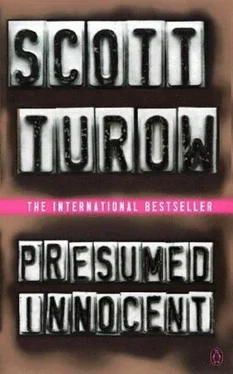Scott Turow - Presumed innocent
Здесь есть возможность читать онлайн «Scott Turow - Presumed innocent» весь текст электронной книги совершенно бесплатно (целиком полную версию без сокращений). В некоторых случаях можно слушать аудио, скачать через торрент в формате fb2 и присутствует краткое содержание. Жанр: Детектив, на английском языке. Описание произведения, (предисловие) а так же отзывы посетителей доступны на портале библиотеки ЛибКат.
- Название:Presumed innocent
- Автор:
- Жанр:
- Год:неизвестен
- ISBN:нет данных
- Рейтинг книги:4.5 / 5. Голосов: 2
-
Избранное:Добавить в избранное
- Отзывы:
-
Ваша оценка:
- 100
- 1
- 2
- 3
- 4
- 5
Presumed innocent: краткое содержание, описание и аннотация
Предлагаем к чтению аннотацию, описание, краткое содержание или предисловие (зависит от того, что написал сам автор книги «Presumed innocent»). Если вы не нашли необходимую информацию о книге — напишите в комментариях, мы постараемся отыскать её.
Presumed innocent — читать онлайн бесплатно полную книгу (весь текст) целиком
Ниже представлен текст книги, разбитый по страницам. Система сохранения места последней прочитанной страницы, позволяет с удобством читать онлайн бесплатно книгу «Presumed innocent», без необходимости каждый раз заново искать на чём Вы остановились. Поставьте закладку, и сможете в любой момент перейти на страницу, на которой закончили чтение.
Интервал:
Закладка:
As they became better established, Melvin led the Saints into smack. Entire buildings became processing centers. Guys with chemistry degrees would cut the heroin with quinine and lactose while two dudes with M-16's watched them. In a second area six women, each one stark naked to prevent any body-cavity smuggling, made up dime bags, closing them off with seal-a-meals. Out on the streets in Saintland, high-grade heroin was sold from stands. There were drive-up windows in garages to which white kids from the suburbs could come down to score, and on weekends the traffic was so bad that some mogul in caftan and shades would be down there with a whistle telling people where to go. Once or twice the newspapers tried to write about what was going on, but the coppers didn't like it. There were policemen on the take, something the department has traditionally preferred to ignore, and the cops who weren't taking were just scared. The Saints killed. They shot, they garroted, they stabbed. They murdered, of course, in dope squabbles; but they also killed because of minor differences of opinion, because someone insulted the upholstery in somebody's mobile, or because of an innocent brushing of shoulders on the street. They ran six square blocks of this city, their own little Hey Dude fascist arena, a quarter of their terrain occupied by the Grace Street projects.
I have heard it said on many occasions that these projects were drawn from the same architectural plans as the student dormitories at Stanford. Suffice it to say, there is no resemblance now. The small balconies at the rear of each apartment have been curtained off with chicken wire to end the rain of suicides, infants, drunks, and persons pushed, who, over the first five years, became a sauce upon the pavement below. Most of the sliding glass doors to the balconies have been replaced with plywood sheets; and from the balconies themselves a wide variety of objects hang, including laundry, garbage cans, gang banners, old tires, car parts, or, in winter, anything that profits by being kept out of the heat. No sociologist can portray how far the life in these three concrete towers is from the existence most of us know. It is not Sunday school, was Lionel Kenneally's favorite phrase. And he was right; it was not. But it was more than cheap irony or even rabid racism could comprehend. This was a war zone, akin to what was described by the guys I knew who came back from Nam. It was a land where there was no future-a place where there was little real sense of cause and effect. Blood and fury. Hot and cold. Those were terms that had some meaning. But you could not ask anybody to do anything that involved some purchase on what might happen next year, even next week. At times when I listened to my witnesses describe the daily events of project life, in the disconnected way most of them had of doing that, I would wonder if they were hallucinating. Morgan Hobberly, my star, a reformed Saint who, truly, got religion, told me that one morning he rolled out of bed to the sound of gunfire outside his door. When he investigated, he found himself caught between two bloods trying to zap each other with carbines. I asked Morgan what he did. 'Back to steep, babe. Not my thing. Pulled my pill over my head.'
In truth, my four years of investigation succeeded only because of Morgan Hobberly. The whole incursion into gang life, which Stern has trumpeted before my jury on a dozen occasions, came down to one piece of luck: finding Morgan. An organization like Harukari's did not have the kind of membership who could not be bought. Dozens of them were informants for the police or the federal agencies. But Melvin was smart enough to have a few of them out there doing counter-intelligence work. We were never sure what was right, since we got, through our sources, two or three different stories at any one time.
But Morgan Hobberly was the real thing. He was on the inside. Not particularly because he wanted to be, but because the Saints enjoyed having him around. Everybody knows a Morgan Hobberly. He was born cool, given a grace the way some people are born to music, or horses, or high jumping. His clothes just hung on him right. His movements were lithe. He was not so much beautiful as composed, not so much handsome as present. Aloof was not the right word as much as magical. There was a vibration he stirred in me that somehow reminded me of my feelings for Nat. And because some moral voice that Morgan took for divine told him one morning that Harukari's ways were evil, Morgan secretly went to work for the state. We put a body recorder on him and he sat in the meetings of chieftains. He gave us the numbers of phones that we connected to pen registers and, eventually, tapped. In the seventy days that Morgan Hobberly helped us, we gathered virtually all the evidence for trials that lasted another two years. He did not make it, of course. The good, they say, never do. It was Kenneally who told me they'd found Morgan. They had a call from the Public Forest district command, he said, and it didn't sound encouraging. When I arrived, there was already that funny scatter of cops and paramedics and reporters familiar to a murder scene. Nobody wants to talk to anybody else; nobody wants to be near the body. People were all over, shot out in different places like spores. I couldn't figure where he was. Lionel was there already, with his hands dug deep into his windbreaker. He gave me that low look of his, the varlet's eyes. We fucked up bad, he was saying; and then his eyes drifted back enough for me to guess the general direction. He had died of drowning. So Coroner Russell Latei determined-I would not let Kumagai near the body. He had died of drowning, the coroner found, in the waste pool of a public outhouse. That was where he was. Upside down, with his head, and his two broken shoulders, pushed through the wooden seat. Rigor mortis had set in, so that his legs were spread at a kind of scarecrow angle, and his plain twill work pants and raveled nylon socks and worn oxfords created an atmosphere of unbearably humble address. His skin-the band of flesh visible where the pants and socks didn't meet-was purple, a royal shade. I stood in that tiny wooden shack, where a fly or two still buzzed even though it was now November, where the air was rank even without the summer heat, and contemplated Morgan Hobberly's strange humor and the ether on which I always thought that he could float. I believed less then in angels and ghosts, because I had thought surely that this was one man who, as he made his way through the world, could not be touched.
Lipranzer is looking cold-not unemotional or distant, but actually cold, although the nighttime temperature in August is still verging on the seventies. His shoulders are hunched close and his windbreakers is zipped tight. I know him well enough to recognize this is a sign of discomfort, if not fright. On this turf, I am probably more experienced.
"How you doin, Charlie Chan?" I ask him as we head up the concrete staircase.
"Me no likee this one, boss," he says. "Uh-uh. No fuckee way."
In the projects, a staircase is a building's main thorough-fare. The elevators are seldom operable, and when they are, nobody will get on them anyhow, since there is no mercy for him who finds himself between floors with a carload of Saints. Instead, all commerce is transacted in this stairwell. Dope is sold here; wine is drunk here; love is made. It is near 3 a.m. and still this vertical Ganges is not completely deserted. Near floor 4 two young men are drinking something in a bag and trying to romance a young woman whose head is lolled back against the cinder blocks. "How you doin, brother?" they say to a black man who happens to be climbing up ahead of us. To Lip and me, they say nothing, but their looks are insolent and cold, and Lip, without missing a step, flips out his tin as we are going past. He does not want to be mistaken for an ordinary white man.
Читать дальшеИнтервал:
Закладка:
Похожие книги на «Presumed innocent»
Представляем Вашему вниманию похожие книги на «Presumed innocent» списком для выбора. Мы отобрали схожую по названию и смыслу литературу в надежде предоставить читателям больше вариантов отыскать новые, интересные, ещё непрочитанные произведения.
Обсуждение, отзывы о книге «Presumed innocent» и просто собственные мнения читателей. Оставьте ваши комментарии, напишите, что Вы думаете о произведении, его смысле или главных героях. Укажите что конкретно понравилось, а что нет, и почему Вы так считаете.












